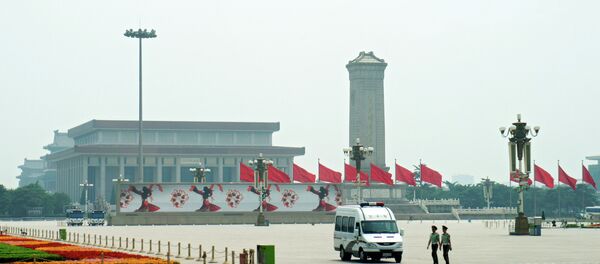Ekaterina Blinova — North America, Western Europe and Japan will be toppled from their leading positions over the next 35 years, while China will ultimately overtake the United States in market exchange rate terms by 2028, according to the latest PricewaterhouseCoopers (PwC) report.
"The global economic power shift away from the established advanced economies in North America, Western Europe and Japan will continue over the next 35 years. China has already overtaken the US in 2014 to become the largest economy in purchasing power parity (PPP2) terms. In market exchange rate (MER) terms, we project China to overtake the US in 2028 despite its projected growth slowdown," PwC's World in 2050 report stated.
How will the world economy look in 2050? See our report http://t.co/o1ROAujubV #PwC #World2050 pic.twitter.com/kNEBU77PMc
— Dennis Nally (@Dennis_Nally) 10 февраля 2015
Unveiling the future of global development, the experts pointed out the exceptional role of emerging economies like India, Mexico and Indonesia. According to their prognosis, India will most likely become the second largest global economy by 2050 (in PPP terms), while Mexico and Indonesia will outperform such developed powers as the UK and France by 2030. The experts projected Turkey to outpace Italy and revealed that Nigeria, Vietnam, Poland, Colombia and Malaysia have a huge potential to become fast growing economies over the next three decades. They predicted that Russia, Saudi Arabia and Brazil may face certain obstacles due to overdependence on natural resources.
The researchers predicted that the world economy will grow at around three percent per year from 2014 to 2050 with steady slowdown after 2020 due to the problem of population aging in developing countries.
On the other hand, the rise of India and China will undermine the positions of North America and Europe on the global market: the US and the EU's share of GDP in PPP terms will diminish drastically from 33 percent in 2014 to about 25 percent by 2050, the experts foresee.
The gap between the three biggest economies (China, India and the United States) and the rest of the world will be growing steadily over the decades. The United States, the third largest economy in 2050, is projected to be 240 percent bigger than Indonesia, the fourth largest economy in the world. Remarkably, both Indonesia and Nigeria are expected to make an incredible leap forward: while Jakarta will emerge from its current ninth position to fourth by 2050, Abuja will jump up to ninth place from 20th in 2014. In contrast, Japan will face a long way down losing its position on the global scale: by 2050 it will slide from fourth to seventh place.
Drawing a bright future for the developing states, the PwC's researchers noted that the rise will probably require both effective investment in infrastructure and further reforming of economic and social institutions of the countries. At the same time, the experts called upon the Westerners to calm themselves down: North America and Europe will remain rather strong and influential players on the world arena in the nearest future.




